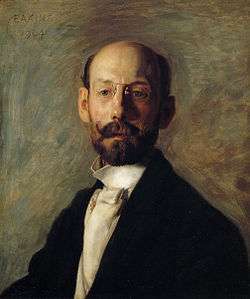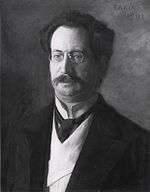Frank B. A. Linton

Portrait of Frank B. A. Linton (1904) by Thomas Eakins.
Frank Benton Ashley Linton (February 26, 1871, Philadelphia, Pennsylvania – November 15, 1943, Philadelphia, Pennsylvania) was an American portrait-painter and teacher. He was an instructor at the Pennsylvania Academy of the Fine Arts in Philadelphia, Pennsylvania. Likely a closeted gay man, he lived with pianist Samuel Meyers for more than 30 years.
Education and career
Linton entered the Pennsylvania Academy of the Fine Arts in 1885 (at age 14), and studied under Thomas Eakins. Eakins was forced to resign in February 1886. Linton remained at PAFA until 1888, then studied again with Eakins at the Art Students' League of Philadelphia. In 1890, he was accepted at the École nationale supérieure des Beaux-Arts in Paris, and studied there under Eakins's teachers, Jean-Léon Gérôme and Léon Bonnat. He then studied at the Academie Julien under Jean-Joseph Benjamin-Constant, Jean Paul Laurens, and William-Adolphe Bouguereau.[1] He returned to Philadelphia around 1896.
In addition to portraits, he painted landscapes and modeled sculpture. He sometimes worked as a copyist of paintings, including American colonial and federal portraits. He exhibited at the National Academy of Design, and the 1904 St. Louis Exposition. In 1917, he had a one-man show at the Corcoran Gallery of Art in Washington, D.C.[2]
He exhibited regularly at PAFA and at the conservative Paris Salon. His 1922 portrait of a clown applying greasepaint, The Last Touch (Le Denier Retouche), was rejected for exhibition at PAFA, but won a bronze medal at the 1927 Paris Salon. It was bought for the collection of the Musée du Luxembourg, and hung at the Louvre.[3] He was decorated by the French government with the rank of Officier d'Academie.
1941 Profile
"His claims to serious consideration, particularly in portraiture and figure work, were soon recognized and at the age of twenty-three he was awarded the silver medal for his exhibit at the American Art Exhibition. His first portrait hung in Paris, that of Dr. J. L. Borsch of Philadelphia, won for him enormous acclaim.
"Mr. Linton is also a member of the Internationale Union des Beaux-arts et Lettres, to which only one member in the entire world is elected each year. He received this honor in 1913, when his name was enrolled among the illustrious greats comprising the membership of the Internationale Union des Beaux-Arts et Lettres, including such personages as Kipling, Rodin, Degas, Anatole France, Renoir and many more.
"Mr. Linton's facility and versatility, which have often been remarked, are only superficial aspects of his art, which is profound in its inspiration and superlative in its expression. He is not only a brilliant draftsman and colorist, a master of the brush but also possesses the keen psychological insight, which is the hallmark of genius in portraiture, and a freshness of outlook which reflects the rare quality of his creative imagination and lends individuality to his work. Among present-day artists his gifts are unsurpassed and they have won for him the highest honors in the world of art."[4]
Samuel Meyers

Music (1904) by Thomas Eakins. Hedda van den Beemt was the violinist, Samuel Meyers the pianist.

Portrait of Samuel Meyers (1904) by Thomas Eakins.
From 1901 to 1924, he and Samuel Meyers (b. 1854), a classical pianist, shared a studio at 1707 Chestnut Street. Eakins was a frequent guest, and painted portraits of both men.[5] It is likely that it was at one of their musicales that Eakins met the Philadelphia Orchestra violinist Hedda van den Beemt, the subject of his painting Music (1904), which features Meyers as the pianist.[6][7]
At the studio, Linton hosted a 1924 exhibition of paintings by fellow Eakins students Charles Bregler, David Wilson Jordan and Susan Macdowell Eakins (Eakins's widow), along with his own.[8]
From 1925 to 1933, he and Meyers shared a studio at 2037 Delancey Street. Meyers died in July 1933.[9]
Legacy
Linton, Thomas Anshutz, and Samuel Murray were the Eakins students who probably had the most successful careers. At one time, Linton reportedly commanded $5,000 to $10,000 for a portrait, but he died insolvent, and his effects were sold to pay creditors.[10]
Selected works
- Pickling Gherkins (c.1893–96), inscribed "F. B. A. Linton, Paris."[11]
- Christ Being Raised from the Dead (c.1895), Academie Julien, Paris, France.
- Portrait of Dr. James McCrea (c.1900).
- Portrait of Dr. Matthew Woods (c.1908).[12]
- Portrait of Dr. Perry S. Allen (before 1910).
- Portrait of Mrs. Perry S. Allen, (before 1910).
- Portrait of Samuel Meyers (by 1912), Pennsylvania Academy of the Fine Arts, Philadelphia, Pennsylvania.[13]
- Portrait of Dr. William H. Greene (c.1912).
- Portrait of William L. Austin, Esq. (c.1912).
- Self-portrait (1915), University of Delaware, Newark, Delaware.
- Portrait of Dr. William H. Allen (c.1916), Girard College.[14]
- Portrait of Dr. Adam H. Fetterolf (c.1916), Girard College.[15]
- Portrait of Dr. James Cornelius Wilson (1917), College of Physicians of Philadelphia.
- Portrait of Ruth St. Denis (c.1918).[16]
- Portrait of Mrs. Edwin R. Linton, the Artist's Mother (by 1919), University of Pennsylvania, Philadelphia, Pennsylvania.
- Portrait of Thomas B. Smith, Mayor of Philadelphia (c.1920).
- Portrait of President Warren G. Harding (1920s), St. Charles Borromeo Seminary, Overbrook, Pennsylvania.
- Portrait of Cardinal Dennis Joseph Dougherty (c.1921), Cardinal Dougherty High School, Philadelphia, Pennsylvania.[17]
- Portrait of Professor Herbert Spencer Jennings (1921), Johns Hopkins University, Baltimore, Maryland.[18]
- Portrait of General John J. Pershing (1921), Les Invalides, Paris, France.
- Portrait of Admiral William S. Benson (c.1921).
- The Last Touch (Le Denier Retouche) (1922), Musée du Luxembourg, Paris, France. Won a bronze medal at the 1927 Paris Salon.
- The Silver Heel: Portrait of Agnes Allen (1923), Pennsylvania Academy of the Fine Arts, Philadelphia, Pennsylvania.
- Portrait of Mabel Linton Williams (1924), Corcoran Gallery of Art, Washington, D.C..
- Self-portrait (c.1935), Pennsylvania Academy of the Fine Arts, Philadelphia, Pennsylvania.[19]
- Portrait of Senator Daniel Oren Hastings (1939), Delaware State Capitol, Dover, Delaware.
Undated
- Cows in front of a Barn.[20]
- An Evening's Reminiscence.[21]
- Italian Girl, University of Delaware, Newark, Delaware.[22]
- Seated Country Girl, University of Delaware, Newark, Delaware.
- Samuel Meyers at the Piano (destroyed), University of Pennsylvania, Philadelphia, Pennsylvania.
- Veiled Lady, University of Pennsylvania, Philadelphia, Pennsylvania.
- Portrait of James Cowart, University of Pennsylvania, Philadelphia, Pennsylvania.
- Portrait of David Ross, University of Pennsylvania, Philadelphia, Pennsylvania.
- Portrait of Mrs. John Partenheimer, University of Pennsylvania, Philadelphia, Pennsylvania.
- The Romance of Salome, University of Pennsylvania, Philadelphia, Pennsylvania.
References
- Julie S. Berkowitz, The College of Physicians of Philadelphia Portrait Catalogue (Philadelphia, 1984).
- Margaret McHenry, Thomas Eakins Who Painted (Oreland, Pennsylvania: by the author, 1946).
- Phyllis D. Rosenzweig, The Thomas Eakins Collection at the Hirshhorn Museum and Sculpture Garden (Smithsonian Institution, 1977).
Notes
- ↑ McHenry, p. 122.
- ↑ http://www.corcoran.org/exhibitions/archive_results.asp?Year=1917
- ↑ Berkowitz, p. 224.
- ↑ Herman LeRoy Collins and Wilfred Jordon, Philadelphia: A Story of Progress (Lewis Historical Publishing Company, 1941). Quoted at "Frank Benton Ashley Linton". AskArt. Retrieved 4 August 2011.
- ↑ Both portraits are in the Hirshhorn Museum and Sculpture Garden.
- ↑ McHenry, p. 121.
- ↑ Music is at the Nelson-Atkins Museum of Art. A study for it, The Violinist, is at the Hirshhorn Museum and Sculpture Garden. A sketch for Music is at the Philadelphia Museum of Art.
- ↑ 1924 exhibition from Brooklyn Museum.
- ↑ Samuel Meyers obituary: Philadelphia Evening Bulletin, July 21, 1933, quoted in Rosenzweig, p. 192.
- ↑ "Portrait Painter Dies Insolvent, Most of Frank Linton's Works Sold to Pay Creditors." Philadelphia Evening Bulletin, August 4, 1945. See Berkowitz, pp. 222-25.
- ↑ Pickling Gherkins from Freeman's Auctions.
- ↑ Dr. Woods from LiveAuctioneers.
- ↑ Samuel Meyers from PAFA.
- ↑ Girard College history
- ↑ Girard College history
- ↑ Ruth St. Denis from askart.
- ↑ Cardinal Dougherty from Temple University.
- ↑ Professor Jennings from Flickr.
- ↑ Self-portrait from PAFA.
- ↑ Cows from LiveAuctioneers
- ↑ An Evening's Reminiscence from Freeman's Auctions.
- ↑ Italian Girl from The Illustrated Gallery.